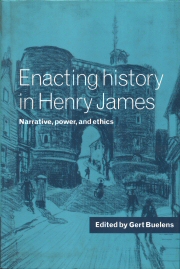Book contents
- Frontmatter
- Contents
- Notes on contributors
- Acknowledgments
- List of abbreviations
- Introduction
- 1 Power relations in the novels of James: the ‘liberal’ and the ‘radical’ version
- 2 Multiple germs, metaphorical systems, and moral fluctuation in The Ambassadors
- 3 James and the ethics of control: aspiring architects and their floating creatures
- 4 James and the shadow of the Roman Empire: manners and the consenting victim
- 5 ‘What Maisie knew’: Henry James's Bildungsroman of the artist as queer moralist
- 6 The double narrative of ‘The Beast in the Jungle’: ethical plot, ironical plot, and the play of power
- 7 Homoeroticism, identity, and agency in James's late tales
- 8 ‘A provision full of responsibilities’: senses of the past in Henry James's fourth phase
- 9 Possessing the American scene: race and vulgarity, seduction and judgment
- 10 History, narrative, and responsibility: speech acts in ‘The Aspern Papers’
- Index
Introduction
Published online by Cambridge University Press: 02 February 2010
- Frontmatter
- Contents
- Notes on contributors
- Acknowledgments
- List of abbreviations
- Introduction
- 1 Power relations in the novels of James: the ‘liberal’ and the ‘radical’ version
- 2 Multiple germs, metaphorical systems, and moral fluctuation in The Ambassadors
- 3 James and the ethics of control: aspiring architects and their floating creatures
- 4 James and the shadow of the Roman Empire: manners and the consenting victim
- 5 ‘What Maisie knew’: Henry James's Bildungsroman of the artist as queer moralist
- 6 The double narrative of ‘The Beast in the Jungle’: ethical plot, ironical plot, and the play of power
- 7 Homoeroticism, identity, and agency in James's late tales
- 8 ‘A provision full of responsibilities’: senses of the past in Henry James's fourth phase
- 9 Possessing the American scene: race and vulgarity, seduction and judgment
- 10 History, narrative, and responsibility: speech acts in ‘The Aspern Papers’
- Index
Summary
On 26 July 1909, Henry James writes to Frederick Macmillan to enlist his publisher-friend's help in a delicate matter. James indicates his wish to direct the then sizeable sum of £100 discreetly to his ‘accomplished and greatly valued friend of many years Morton Fullerton’, explaining that he know[s] something ― a good deal, of his personal and family situation, and especially of the financially depleting effect on him, lately aggravated, of the condition of his father, ill and helpless these many years in the US, and to whom he has had constantly to render assistance' (HJL, iv, 529). Since Fullerton, the head of the Paris bureau of the (London) Times, has just been invited by the firm of Macmillan to write a book on the French capital, it strikes James' as not unlikely that he may have to write and ask for some advance on the money he is to receive from you, for getting more clear and free for work at his book'. James wonders whether Macmillan would at that point be willing to send [the £100] to him, as a favour to me, as from yourselves (independently of anything you may yourselves send him?) and with no mention whatever, naturally, of my name in the matter?'
At first sight, Jame's letter offers touching testimony to a magnanimous impulse. Here, we might say, is the sixty-six-year-old James applying, in duly circumspect fashion, such pecuniary and social clout as he has by now attained to the altruistic cause of enabling a younger friend to devote himself to his writing.
- Type
- Chapter
- Information
- Enacting History in Henry JamesNarrative, Power, and Ethics, pp. 1 - 15Publisher: Cambridge University PressPrint publication year: 1997

